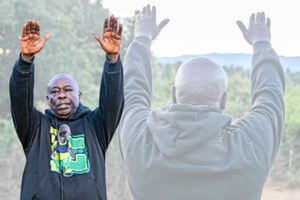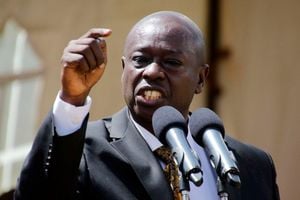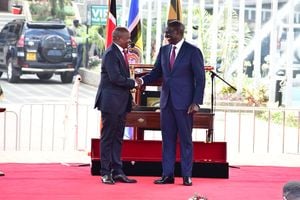
Former Deputy President Rigathi Gachagua addresses journalists outside Karen Hospital in Nairobi on October 20, 2024.
Impeached Deputy President Rigathi Gachagua is a man fighting for his political life after the High Court lifted conservatory orders that blocked the swearing-in of his Prof Kithure Kindiki as his replacement.
The DP has a chance to fight the impeachment, all the way to the Supreme Court but in realpolitik, he knows that it may not be possible to make his way back to the second floor of Harambee House annex offices where he has been operating from.
This after Prof Kindiki was sworn-in on Friday as the country’s third deputy president under the 2010 constitution.
President William Ruto was the first DP under President Uhuru Kenyatta followed by the impeached Gachagua under President Ruto.
Constitutional lawyers Bob Mkangi, who was among the experts that drafted the 2010 constitution, Senior Counsels (SCs) Charles Kanjama and Ahmednassir Abdullahi, and Mr David Ochami argue that the impeached DP has a chance to seek remedies in court.
Mr Mkangi notes that if dissatisfied and perceives that his constitutional rights have been infringed, in principle, the impeached DP should keep fighting for redress.
“Depending on his future ambitions, in public services especially, he may need to ensure his good standing, constitutionally. Furthermore, and as we have seen, exhausting the judicial conveyor belt enriches our jurisprudence though not always, unfortunately, but which is healthy for constitutional building,” said Mr Mkangi.
Mr Mkangi’s argument is alive to Article 75 (3) of the constitution which states that a person who has been dismissed or otherwise removed from office is disqualified from holding any other State office.
According to SC Abdullahi, “The Deputy president shall overcome.”
“Tribulations are part of what makes a man stronger. The possibility of the impeachment reaching the final stage is almost zero,” SC Abdullahi posted on his X account.
If the courts uphold the impeachment and removal from office of Mr Gachagua, he will not be allowed to vie or get appointed for any public office.
This means that he will be done politically and cannot access his retirement perks that includes an office, staff and state of the range cars financed by the taxpayer.
The fact that Mr Gachagua served for less than two and half years as DP disadvantages him as he will not be qualified to take home his gratuity.
His situation is further made worse because having served as MP for one term- between 2013 and 2017, he is not qualified for pension as a former MP.
The Parliamentary Pensions Act provides that for a former legislator to qualify for a pension, he or she must have served in parliament for at least two terms.
Therefore, the only benefit the impeached DP has is to get the looming political restrictions out of his way by appealing against his impeachment.
SC Kanjama notes that judicial remedies allow for appeals all the way to the Supreme Court of Kenya (SCoK) to challenge his impeachment and removal from office.
“Cases have been lost in the High Court and the Court of Appeal but won at the Supreme Court,” says SC Kanjama.
While the odds are stacked against the impeached DP in terms of having his ‘DP’ position back because you cannot un-swear someone, he has a right to fight for his impeachment.
“Mr Gachagua should be ready to continue taking advantage of the judicial remedies available for him. If the courts finally find that he was wrongfully impeached and therefore wrongfully removed from office, who knows?” said SC Kanjama.
Mr Ochami, a lawyer cum journalist, argues that since the conservatory orders have been lifted, there is every likelihood that the DP's post will be occupied in the coming hours.
“I disagree with the reasoning of the justices in lifting the orders because it does not seem to be based on any compelling stare decisis or jurisprudence, but rather on their reading of Article 147 of the Constitution,” said Mr Ochami.
Mr Ochami says that the lifting of the orders does not extinguish the substantive applications by the impeached and other petitioners before the constitutional court.
“Nothing will stop the courts from ruling in the impeached DP’s favour, in the substantive applications, if the evidence and the law are in his favour.”
The lawyer cum-journalist notes that the impeached DP needs a strong urge to redeem himself in the eyes of the Kenyan public, a redemption that he says has no other route but through the Courts.
“If he feels so strongly, has faith in the courts and he has the patience and means then he has nothing to lose in defending his rights in courts,” says Mr Ochami adding; “I would not give up, no matter the setbacks.”
However, Mr Ochami recognizes that it is a tall order for him to be reinstated to office, it is worth fighting for to be vindicated.
“By law and in spite of today's orders and even if Prof Kindiki is sworn to office, there are still many remedies available for Rigathi Gachagua that can be awarded by courts in the fullness of time if he prevails.”
But even as the lawyers argue, the impeached DP will ultimately have a choice to make.
The choice will include making an omelet with his broken eggs, which essentially means using sympathy from his Mount Kenya political base to create political capital out of it.
But the question of how long the sympathy will last, no one knows.
According to Mr Ochami, the judges erred by finding that Article 147 does not contemplate a vacancy in the office of the DP.
“You do not read that Article in isolation because the Constitution also creates a 74 day period within which to nominate a candidate to replace an impeached DP,” said Mr Ochami.
He argues that it is common sense, “contemplated by a purposive interpretation of the Constitution as a whole that the National Assembly can reject Kindiki and compel the president to, either re-nominate him or seek another replacement.”
“So it is not true that failure to fill the DP's post in the manner argued by the judges violates Article 147.”











